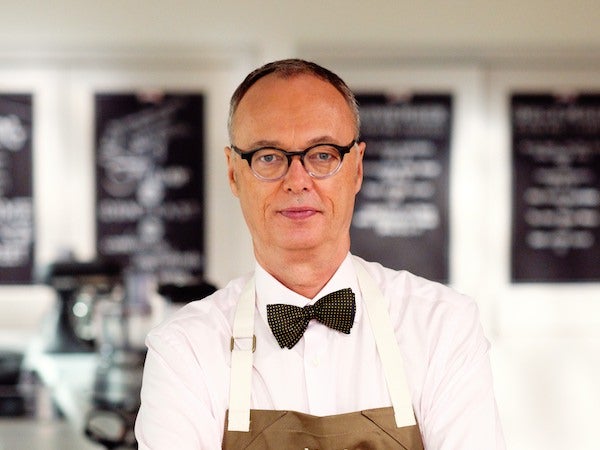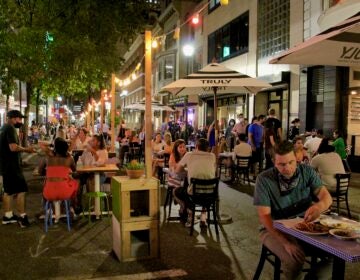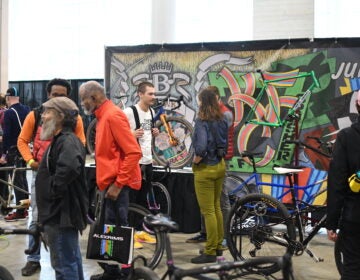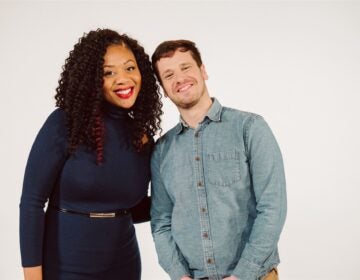Milk Street host Christopher Kimball talks bridging cultural divides through food
Milk Street host/creator Christopher Kimball talks to Morning Edition host Jennifer Lynn about the new season of his show and his new book, “Cookish.”
Listen 6:08
Christopher Kimball, host/creator of "Milk Street." (Courtesy of Milk Street)
Christopher Kimball wants to transform the way Americans cook and eat. He has a unique perspective and said ethnic cooking is simply dinner or lunch served somewhere else in the world.
His show “Milk Street” is a culinary – not cultural – exchange. The new season starts Saturday on WHYY-TV.
He spoke with Morning Edition host Jennifer Lynn about the show and his new cookbook that comes out next month titled “Cookish.”
–
Hello, Christopher.
How are you?
I’m doing well. Why the “-ish” in “Cookish?”
Because it’s supposed to be six ingredients other than salt, pepper, olive oil, etc. You can, “throw together.” It’s kind of cooking. It’s so interesting. When I started cooking in the late ’60s, ’70s, I think a lot of the cookbooks were giving you the “Saturday night” recipes. The jeweled rice with 20 ingredients, not the quick recipe someone puts together in Mumbai for dinner. It’s sort of like history, as the stories of the kings and queens, and now everyone’s interested in the everyday person. I want to know what the real people, real person in Beirut cooks and they cook madra, right? They cook rice and lentils and some caramelized onions. That’s a very simple dish. I want that stuff. I don’t want the fancy stuff.
Well, I love cookbooks and not just for recipes. Sometimes they present, like travel logs, passages of activism. What do you look for in a cookbook?
I look for authenticity, a much overused word these days. But someone who’s actually been there and done it. I’m looking for recipes that I haven’t seen before that do things differently that surprise me. The best cooks in the world reduce things down to the basics. I was in Oaxaca a year ago and we were cooking tlayudas, which is this large corn tortilla, and you fill it with black beans, a little siento pork lard, a thin piece of grilled meat, whatever, some cheese, I was cooking with someone on her sidewalk. The sidewalk was three feet wide, right? And there was traffic going by. And I asked her about why she cooked it that way. And she started crying, “because my mother cooked it that way.” So when she cooks this dish, it was because she reminds her of her mother. That moment, standing there on a little narrow sidewalk with trucks going by cooking the tlayuda. Now I understand something about tlayudas that I didn’t understand before if I just got it out of a book. So it’s the person that is really the thing. It’s not just the food.
You did such a great job curating these culinary experiences for your viewers on TV and listeners on the radio. Where do you take your audiences this year?
Mexico City. Eduardo Garcia, I went all the way down there to cook beans with him on a Chinampas. These are the islands in the southern part of Mexico City and the canals. I went to Galilee, cooked with Reem Kassis, author of, “The Palestinian Table.” She introduced me to her family. We cooked in her house. We also went to Bologna, that was one of our first episodes, Savino, which is south west of Bologna. They don’t have a lot of variation, but what they do with those ingredients is amazing. And the “nonnas,” as you know, I cooked with a lot of grandmothers. We fried dough one morning drinking lots of bubbly and drinking coffee.
You said that when you come back from a certain region of the world, a destination, and your wife works on the program with you. She says she notices you change a little bit. When is a time when you notice that the most?
Here’s what happens. You go somewhere, I don’t speak Arabic. I mean, I’m in northern Israel. I’m surrounded by this culture that I know nothing about. Reem Kassis, I knew a little bit from her book, but she takes me into her home in the small town and she has 10 family members there. They’ve cooked like 10 things. Everything in Palestine is times six. Everything’s on a big platter. And they were so lovely. And then everybody came over and I met them. And then I met the guy who grows the olives and presses them. And I met the guy who takes the freekeh, he grinds that, that’s the wheat that’s smoked. And they were so generous. And you go, “This doesn’t comport at all with my idea of what that part of the world is supposed to be like.” Right? It’s always different. And so it changes my view of the world, and actually this sounds a bit grandiose, but of humanity. I’ve never been somewhere where people weren’t nice because we’re cooking.
There’s a lot going on right now. How do you juxtapose your cooking with the big stories of the day, or would you prefer to keep them separate?
I think it’s really important that you tell a lot of people’s stories that have a similar theme to them, which I think is relevant to what’s going on today. It’s about the context, right? So you understand people better through their food. And I think that’s what’s missing very often now is that we don’t understand the other person very well, and food doesn’t solve all those problems. But if you introduce food and the people who make the food, you start to understand people a little better and it brings you a little closer. We need that, right? We need to really understand other people. It’s a way of having that conversation without having it directly. You have it indirectly. And sometimes I think that’s the better way to teach people.
Christopher Kimball is the host of Milk Street. Catch the new season on WHYY-TV, Saturday at 12:30 p.m. Catch Milk Street Radio Saturdays at 1 PM on WHYY-FM. Kimball’s new cookbook is called “Cookish.”

Get daily updates from WHYY News!
WHYY is your source for fact-based, in-depth journalism and information. As a nonprofit organization, we rely on financial support from readers like you. Please give today.






